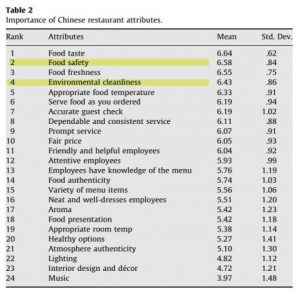Highlighted attributes my emphasis – Nicholas Pastras
The study found that the top four attributes that influenced and inform someone’s experience of satisfaction in a Chinese restaurant are taste, food safety, food freshness and environmental cleanliness.
Now here are three very important things that I take away from these findings
-
- There are a lot of attributes in their list, including fair price, food authenticity, food presentation and a variety of aspects about customer service – all of which you’d think would be extremely important when it came to rating client satisfaction in a Chinese restaurant, but they all came in well below environmental cleanliness!
- When you consider what the study found to be the four most significant attributes influencing a customer’s sense of satisfaction, the quality of cleaning in the restaurant is relevant to two of them, food safety and environmental cleanliness.
Now I realise I am a cleaning company CEO researching and writing about client satisfaction, but even I am surprised at how highly aspects of cleanliness correlated with customer satisfaction ratings, and how important they were to the customers in this survey.
This certainly makes a strong case to owners of any food business that customer perceptions of hygiene and cleanliness are extremely important to your success.
Over the next few months, I intend to look at similar studies like this one, done in other commercial environments. I’ll force myself to struggle through the dry scientific preamble and get to the bottom of what scientists think drives satisfaction in business, and share the results with you.
WHAT I HOPE YOU GET FROM THIS ARTICLE
I hope you found this article more interesting than the typical lightweight rubbish you find in cleaning blogs online, and if you do, I’d like you to appreciate that my efforts to put something more interesting and significant into our blog, is a reflection of our entire approach at Smart Cleaning Solutions.
When I started Smart Cleaning Solutions, I wanted to bring a standard of excellence to a cleaning service, beyond what other cleaning companies were doing, because I truly believe in doing things better, and that the quality of what you do makes a difference to customer satisfaction.
As a CEO, that’s what I stand for in our business, and so does the entire team here at Smart Cleaning Solutions. From the cleaners at the coal face cleaning your business, right through to the account management, office staff and senior management; everyone embraces and shares these same values.
That’s how we engineer our efforts to stand out in our industry, by doing things better!
Author Bio: Nicholas Pastras is the CEO of Smart Cleaning Solutions, one of Australia’s fastest growing commercial cleaning companies. At time of writing he has 23 years’ experience in the commercial cleaning industry.03
 Back to all Articles
Back to all Articles